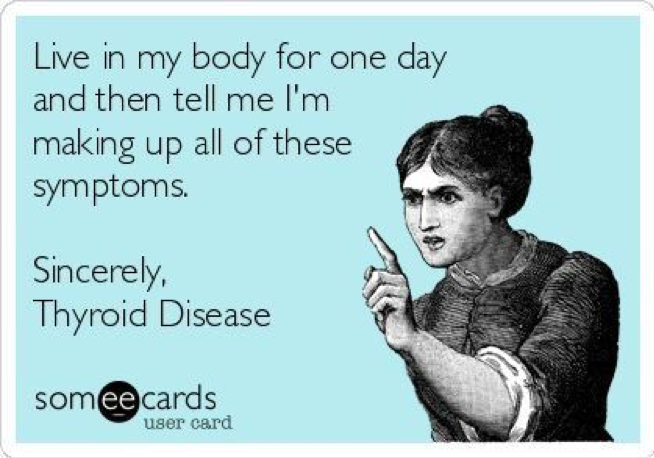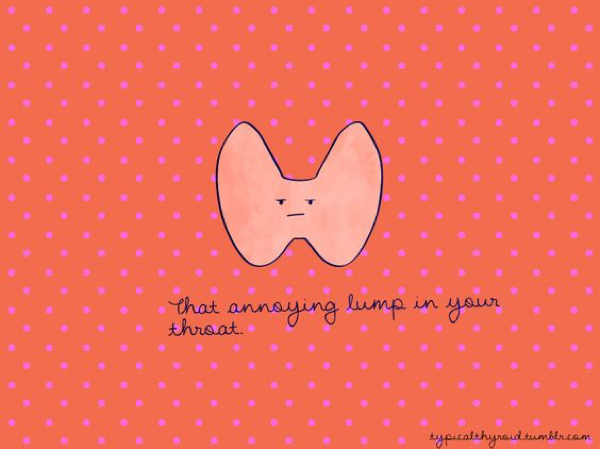The thyroid is a small butterfly-shaped gland which is situated at the base of your neck. Wondering how a small gland in the neck could possibly play with your ovaries and disturb your menstrual cycle? Here’s the answer:
The job of this little gland is to make thyroid hormones that regulate one’s metabolism which means it is responsible for your body to regulate the energy usage in almost every organ. Furthermore, it also controls several functions of your body such as heartbeats and functioning of the digestive system.
So, let’s take you through the two types of thyroid disorders which disturbs your menstrual cycle.

Hypothyroidism
Hypothyroidism, also known as underactive thyroid gland is a disorder which comes into picture when your thyroid gland fails to produce sufficient thyroid hormone hence making it abnormally inactive. The major issue with hypothyroidism is, it’s hard to self-diagnose but the good part is that it can easily be treated if detected in the early stage.
How do you know if you have Hypothyroidism
- Missed period (Amenorrhea)
- Irregular periods (Oligomenorrhea)
- Heavy bleeding during menstruation
- Weight gain
- Slowed heart rate
- Fatigue
- Sensitivity to cold temperature
- Muscle stiffness, aches, and tenderness

Complications caused by Hypothyroidism
- Weakens the insulin sensitivity
- Impairs the process of detoxification of estrogen
- Lowers the coagulation factors
- Reduces sex hormone binding globulin (SHBG)
Hyperthyroidism
Hyperthyroidism, also termed as overactive thyroid gland is a disorder which happens when excessive thyroid hormone is produced and hence disturbs the menstrual cycle and may also cause other health problems.
How do you know if you have Hyperthyroidism
- Sudden weight loss
- Rapid or irregular heartbeat
- Sweating
- Protruding eyes
- Enlarged thyroid gland
- Dizziness
- Shortness of breath
- Loss of consciousness
Complications caused by Hyperthyroidism
- Increases the risk of heart problems like atrial fibrillation and congestive heart failure
- Interferes with your body’s ability to incorporate calcium into bones causing weak, brittle bones (osteoporosis)
- Affects the skin, causing redness and swelling.
- Often causes fever, rapid pulse rate and even delirium which is known as thyroid storm
- Causes eye problem which is known as thyroid eye disease or Graves’ ophthalmopathy

So ladies, know your thyroid – a little knowledge always makes a big difference!
The spectrum of symptoms in case of both thyroid disorders is very broad and therefore we recommend consulting a gynaecologist in the near future in case you encounter any of them. Although a small variation in thyroid volume is normal, it’s always good to keep a track of your health.
We hope this post helps you understand thyroid better. If you feel like you’re experiencing any of the above-mentioned symptoms, our expert advice is only a mail away!
Besides that, don’t forget to subscribe and be a part of the Nua care program for you wouldn’t want to miss the chance of availing exciting offers!
FAQs
- What causes thyroid disease?
- Imbalance in TSH levels or sometimes because of problems in the thyroid gland.
- What is thyroidectomy?
- Removing all or part of the thyroid gland through a surgery.
- How to get rid of thyroid problems?
- A balanced diet, regular exercise along with proper medication.
- What are thyroid cancer symptoms?
- Lump, swelling, pain in the neck, constant cough, trouble swallowing are some of the symptoms.
- What is thyroiditis?
- A condition of inflammation of thyroid gland.






